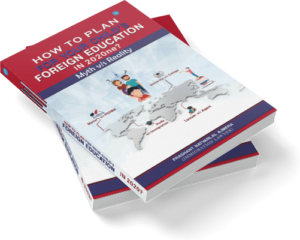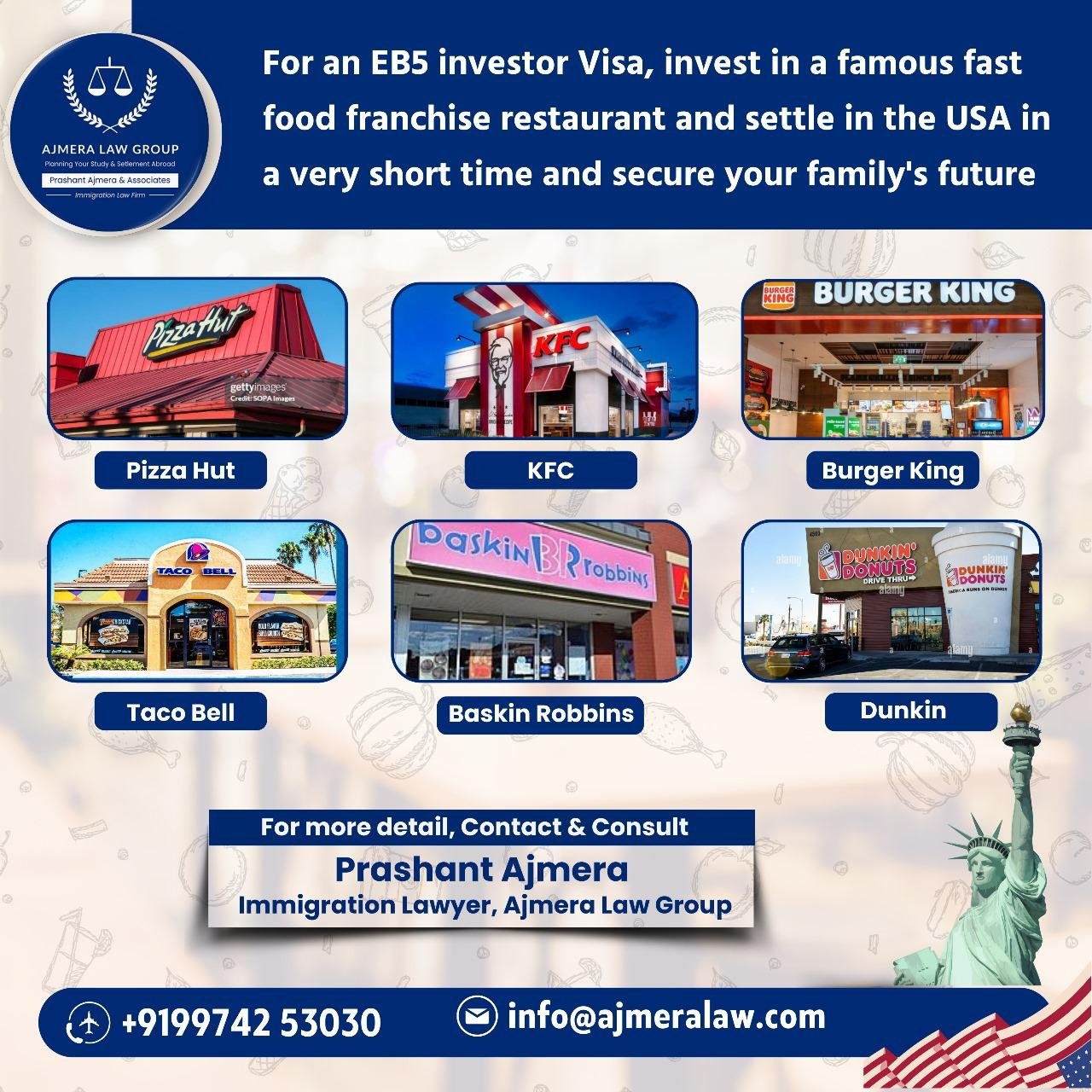
USA Business visa Or Green card of USA for
Business Person, Sr. Executives, Managers, Technical Person and Investors
USA Green card under EB-5 visa program
EB-5 Investor Visa Program: (June 2021 Updates)
The US government introduced the Residency by Investment program in 1991. The USA Immigrant Investor Program (USA IIP) or more commonly known as the EB-5 visa or the million-dollar Green Card is an easy and quick way of obtaining a Green Card based on US investment. The fifth employment based visa preference category, created by Congress in 1990, is available to immigrants seeking to enter the United States in order to invest in a new commercial enterprise that will benefit the US economy and create at least 10 full-time jobs. There are two ways to invest within the EB-5 category and they are :
- Creating a NEW commercial enterprise or
- Investing in a troubled business
As per the US Bureau of Citizenship and Immigration Services website, “entrepreneurs (and their spouses and unmarried children under 21 years) who make an investment in a commercial enterprise in the United States and who plan to create or preserve ten permanent full time jobs for qualified United States workers, are eligible to apply for a Green Card (permanent residence).
Up to 10,000 visas may be authorized each fiscal year for eligible entrepreneurs.
An applicant must invest US$1,050,000 (1.05 million) or at least US$800,000 in a targeted employment area (high unemployment or low populated rural area). In return, USCIS may grant conditional permanent residence to the individual, his/her spouse and children under the age of 21 years.
(Changes implemented as of 15st March, 2022)
Who can qualify?
There are three ways within the EB-5 category which can qualify an applicant for a Green Card and they are:
New Business Enterprise:
To qualify, the applicant must:
- Invest or be in the process of investing at least US$1,050,000. If the investment is in a designated targeted employment area (discussed further below) then the minimum investment requirement is US$800,000.
- Benefit the U.S. economy by providing goods or services to U.S. markets.
- Create full-time employment for at least 10 U.S. workers. This includes U.S. citizens, Green Card holders (lawful permanent residents) and other individuals lawfully authorized to work in the U.S. (however it does not include the applicant, his/her spouse, sons or daughters).
- Be involved in the day-to-day management of the new business or directly manage it through formulating business policy – for example as a corporate officer or board member.
Targeted Employment Area (TEA) is defined by law as, “a rural area or an area in USA that has experienced high unemployment of at least 150% of the national average.”
This TEA was previously decided by the concerned state government. Under the new rules, it will be now decided by the United States Citizenship & Immigration Services (USCIS).
Troubled Business:
To qualify, the applicant must:
- Invest in a business that has existed for at least two years.
- Invest in a business that has incurred a net loss, based on generally accepted accounting principles, for the 12 to 24 month period before the applicant filed the Form I-526 Immigrant Petition by an Alien Entrepreneur.
- The loss for the 12 to 24 month period must be at least equal to 20% of the business’s net worth before the loss.
- Maintain the number of jobs at no less than the pre-investment level for a period of at least two years.
- Be involved in the day-to-day management of the troubled business or directly manage it through formulating business policy. For example, as a corporate officer or board member.
- The same investment requirements of the new commercial enterprise investment apply to a troubled business investment (US$1,050,000 or US$800,000 in a targeted employment area).
- Regional Centre Pilot Program: (A majority of investors apply under this program):
To qualify, the applicant must:
- Invest at least US$1,050,000 or US$800,000 in a regional centre affiliated to a new commercial enterprise or a troubled business located within the area of the USCIS designated Regional Centre (RC).
- Create at least 10 new full-time jobs either directly or indirectly through the capital investment.
Of the 10,000 investor visas (i.e. EB-5 visas) available annually, 5,000 are set aside for those who apply under a pilot program involving an INS-designated “Regional Centre.”
Benefits:
Get the best consulting to implement these ways with a US immigration lawyer in Ahmedabad
USA L1 A & B Visa – Intra company transfer
United States has a very open economy and has allowed foreign companies to enter in to the USA to conduct business in variety of ways – Opening a new company in USA, taking over an established business or entering into a joint venture with an American company.
When a foreign company enters in to the U.S. market, the requirement to bring its key personnel into USA may arise. This transfer of key persons, who are working for the foreign company, to work in USA is called Intra Company Transfer and the visa issued to such persons is called L1 visa.
There are 2 different types of L-1 visas and each has its own set of requirements:
- L-1A is for managers or executives
- L-1B is for workers/employees with specialized knowledge
There are also two different procedures to obtain L-1 visa – Regular and Blanket.
Regular L-1 visas need to be approved by USCIS individually (on a case-by-case basis) Blanket L-1 visas do not need to be approved individually and are made available to employers that meet certain criteria.
L-1 Visa Requirements – Qualifying Employer Relationship between US company and Foreign company
- The US company must have a relationship with the foreign company, which makes it eligible for this type of visa, such as an affiliate company, a branch or subsidiary.
- The US company must also be, or will be, doing business as an employer in the United States and in at least one other country directly or through a qualifying organization for the duration of the beneficiary’s stay in the United States as a L-1 visa holder.
- This does not mean though that this organization is doing international trade. Doing business in those terms mean positioning goods/services regularly in foreign grounds.
The L-1 visa is not country specific, and it is a Dual Intent visa. Dual Intent means that beneficiaries are not required to maintain a foreign residence and may apply for a Green Card later.
L-1A Visa Requirements – For employees
Persons who wish to come to USA on a L1A visa must meet the following requirements:
- The employee must have worked abroad for the overseas company for a continuous period of one year during the preceding three years before admission to the United States.
- The employee must have been employed abroad in an executive or managerial position, otherwise known as a qualifying position.
- The employee must be coming to the U.S. to work in an executive or managerial position. According to Federal law, executive capacity generally refers to the employee’s ability to make decisions of wide latitude without much oversight. Managerial capacity generally refers to the ability of the employee to supervise and control the work of professional employees and to manage the organization, or a department, subdivision, function, or component of the organization. It may also refer to the employee’s ability to manage an essential function of the organization at a high level, without direct supervision of others.
- The employee must be qualified for the position by virtue of his or her prior education and experience.
- The L-1A visa holder must intend to depart the United States upon completion of his or her authorized stay.
L-1B Visa Requirements – For employees
Persons who wish to come to USA on a L1B visa must meet the following requirements:
- The employee must have worked abroad for the overseas company for a continuous period of one year during the preceding three years before admission to the United States.
- The employee must be seeking to enter the United States to render services in a specialized knowledge capacity to a branch of the same employer or one of its qualifying organizations.
- Specialized knowledge is beyond the ordinary and not commonplace within the industry or the petition organization. In other words, the employee must be more than simply skilled or familiar with the employer’s interests. This specialized knowledge can refer to the petitioning organization’s product, service, research, equipment, techniques, management, or other interests and its application in international markets. Or, it could refer to an expertise in the organization’s processes and procedures.
- The L-1B visa holder must intend to depart the United States upon completion of his or her authorized stay.
- Following the 2004 Visa Reform Act, an L-1B non-immigrant will be in violation of status if they are stationed primarily at the worksite of an employer other than the petitioner, and if one of the following occurs:
- The alien will be principally under the control and supervision of the unaffiliated employer, or
- The placement at the non-affiliated worksite is “essentially an arrangement to provide labour for hire for the unaffiliated employer,” rather than placement in connection with the provision of a product or service for which specialized knowledge specific to the petitioning employer is necessary.
L-1A Visa Requirements for Blanket L-1:
- The company must already have an office in the United States that has been operating for at least one year.
- The company must have at least threedomestic/foreign branches, affiliates or subsidiaries.
- In addition, the company must meet oneof the following:
- The company must have obtained a minimum of 10 L-1 approvals in the 12-month period prior to filing a blanket petition
- The company and its U.S. subsidiary and affiliates must have combined annual sales of at least US$25 million.
- The company has a workforce in the United States of at least 1,000 employees.
L-1A Visa Requirements for a new company:
All of the above, but instead of annual reports or tax returns, a business plan (including projected income statement, balance sheet and organizational chart) is required.
L-1A & B Visa Requirements for an Extension / Renewal:
All of the above, along with copies of the beneficiary’s three most recent pay checks
USA EB-1 ( C) Green card under merger and acquisition
The EB-1 (c) visa allows certain multinational managers and executives to gain legal permanent residence in the USA. There is no investment requirement and these individuals are granted an unconditional Green Card (permanent residence of USA) if they meet the qualifying program requirements.
Program requirements:
- Applicant must have been employed outside the United States for at least 1 year in the 3 years preceding the petition or the most recent lawful non-immigrant admission if applicant is already working for the U.S. petitioning employer.
- The U.S. petitioner must have been doing business for at least 1 year, have a qualifying relationship (parent, subsidiary or affiliated) to the entity the applicant has worked for outside the U.S., and intend to employ the applicant in a managerial or executive capacity.
- There is no labour certification required.
- Under this visa category, the applicant will obtain an unconditional Green card of USA, along with his/her dependent spouse and children under the age of 21 years.
- Under this category, it is also possible for a foreign company to acquire an American entity or a business which is operating in the USA for more than 1 year and then transfer its managers or executives to the United States. There is no amount specified for the investment to be made in the USA.
- There is no minimum age, education or language requirement to apply under this category.
USA E2 Visa - For citizens of treaty investor countries
The E-2 Treaty Investor Visa is a non-immigrant visa which allows citizen of certain countries (with which the US government has signed a treaty, agreement or special commercial arrangement) to receive this non-immigrant visa provided they make a substantial amount of investment in the USA in a business. Certain employees of the investor’s company (in his/her home country) may qualify for an E2 visa and family members of the E-2 visa holder may also qualify for a dependent visa.
There are more the 60 countries in the world who have signed a treaty with the US government and the residents and citizens of these countries can qualify for an E2 visa. However, countries like China and India are not on this list. If citizens of countries who are not on the list wish to apply for an E2 visa, they first need to acquire residency or citizenship of a treaty country. This may then qualify them for an E2 visa.
Some of the countries where Indian citizens can get citizenship within a short period of time are Grenada and Turkey, which are E2 treaty countries. There are also other countries where applicants can apply to first obtain residency and/or citizenship and then subsequently apply for an E2 visa. These countries are: Canada, Latvia, Bulgaria, Poland, Greece, Ireland, Spain and many others (almost 60 in total).
Residents and citizens of treaty countries who are visiting USA on a visitor visa may apply for an E2 visa by applying for adjustment of status. If applicants (belonging to treaty countries) are not in the USA, they may apply at the nearest US embassy or consulate.
In order to qualify for an E2 Treaty Investor Visa, investors must meet the following conditions:
- Be a national of a country with which the United States maintains a treaty of commerce and navigation;
- Have invested, or be active in the process of investing, a substantial amount of capital in a bona fide enterprise* in the United States; and
- Be seeking to enter the United States solely to develop and direct the investment enterprise. This is established by showing at least 50% ownership of the enterprise or possession of operational control through a managerial position or other corporate device.
- The investment should be in a commercial enterprise which is at risk and the object is to generate profit.
- Investment amount must not be obtained directly or indirectly from illegal and / or criminal activity.
- There is no age, qualification or language requirement.
- To welcome businesses of all sizes and shapes, no investment amount is suggested or provided by the USCIS.
What is a substantial amount of capital?
- Substantial in relationship to the total cost of either purchasing an established enterprise or establishing a new one
- Sufficient to ensure the treaty investor’s financial commitment to the successful operation of the enterprise
- Of a magnitude to support the likelihood that the treaty investor will successfully develop and direct the enterprise. The lower the cost of the enterprise, the higher, proportionately, the investment must be to be considered substantial.
*A bona fide enterprise refers to a real, active, and operating commercial or entrepreneurial undertaking which produces services or goods for profit. It must meet applicable legal requirements for doing business within its jurisdiction.
An E2 visa is granted for a period of two years and can be extended every two years provided the investor’s intention is to stay only temporarily in the USA.
The main E-2 visa holder’s spouse and children under the age of 21 years may qualify for a dependent visa.
In general, E-2 visa holders can work for only that company for which the visa has been granted.
USA Start – Up Visa program
Introduced in May 2021, the International Entrepreneur Rule (IER), grants a period of authorized stay to foreign entrepreneurs who demonstrate that their stay in the United States would provide a significant public benefit through their business venture.
Under this visa category, entrepreneurs who are granted parole will be eligible to work only for their start-up business. The spouses and children of the foreign entrepreneur may also be eligible for parole. While spouses may apply for work authorization once present in the United States as parolees, the children are not eligible to work. IER parole is granted for up to three entrepreneurs per start-up entity.
In order to apply under the Start-Up Visa Program of the U.S., start-up founders need to meet the following requirements:
A. Founder(s) must show themselves as entrepreneurs with a Qualifying Start-up Entity.
Evidence and supporting documents that are filed with the petition must demonstrate that –
(1) The founder(s) have a central and active role to play in the operations of a start-up entity, such that they are well-positioned, due to their knowledge, skills, or experience, to substantially assist the U.S. start-up entity with the growth and success of its business;
(2) Possess at least a 10% ownership stake in the U.S. start-up entity, and that the entity:
(a) Was recently formed (for example, created within the five years immediately preceding the filing of the petition) and has been lawfully doing business within the United States during any period of operation since its date of formation; and
(b) Has substantial potential for rapid growth and job creation, evidenced by the receipt of significant capital investment, grants or awards
B. Substantial Investment, Grant or Award.
Founders may be considered for entrepreneur parole if they demonstrate that their start-up entity has received a minimum investment amount or qualified award or grant as described below:
(1) The start-up entity has received a qualified investment, within 18 months immediately preceding the filing of the petition, of at least $250,000 US from one or more qualified investors;
(2) The start-up entity has received, within 18 months immediately preceding the filing of the petition, an amount of $100,000 US or more through one or more qualified government awards or grants; or
(3) If the start-up entity partially meets one or more of the above criteria, founders may still be considered for entrepreneur parole by providing other reliable and compelling evidence of the start-up entity’s substantial potential for rapid growth and job creation.
A lesser amount can be considered on a case by case basis if it can be shown that it is substantial.
C. Investment must be from a ‘Qualified Investor’.
The term ‘qualified investor’ for purpose of entrepreneur parole means an individual who is a U.S. citizen or lawful permanent resident of the United States, or an organization that is located in the United States and operates through a legal entity organized under the laws of the United States or any state, that is majority owned and controlled, directly and indirectly, by U.S. citizens or lawful permanent residents of the United States, provided such individual or organization regularly makes substantial investments in start-up entities that subsequently exhibit substantial growth in terms of revenue generation or job creation.
Such an individual or organization may be considered a ‘qualified investor’ if, during the preceding five years:
(1) The individual or organization has made investments in start-up entities in exchange for convertible debt or other security convertible into equity commonly used in financing transactions within their respective industries comprising a total in such 5-year period of no less than $600,000 US; and
(2) Subsequent to such investment by such individual or organization, at least 2 such entities have each created at least 5 qualified jobs or generated at least $500,000 US in revenue with average annualized revenue growth of at least 20%.
D. Additional Supporting Evidence.
Additional supporting evidence concerning the start-up entity’s business, its substantial potential for rapid growth and job creation as well as the founders’ day-to-day role in the business has to be submitted.
If the start-up entity partially meets the qualified investment, government grant or award criteria, founders may be still considered for parole by providing other reliable and compelling evidence that the start-up entity has substantial potential for rapid growth and job creation.
Such supporting evidence may include, but is not limited to, the following:
(a) Evidence of rapid growth, such as – number of users or customers, revenue generated by the start-up entity, additional investments/fundraising, including crowd funding platforms
(b) Social impact of the start-up entity
(c) National scope of the start-up entity
(d) Positive effects on the start-up entity’s locality or region
(e) Any other reliable and compelling evidence that the start-up entity has substantial potential for rapid growth and job creation.
Advantages of Moving to USA Under
EB-5 Visa and USA Business Immigration Programs
If you obtain US citizenship by investment, you can save up to 50% for your child’s education fees & settle your child easily in USA

Ajmera Law Group is a boutique law firm specializing exclusively in business immigration programs of many countries around the globe. ALG assists successful family like yours to plan for their child’s foreign education and settlement in an easy, legal and profitable manner. We specialize in EB-5 investor program and Residency and Citizenship by Investment programs of more than 25 countries.
We assist our clients in making EB-5 investment by investing in a direct project, investing in a regional centre project or private EB-5 mutual funds to reduce risk and secure US Green Card for themselves and their family members.
Are you interested in settling in USA, Canada, Australia, New Zeeland, European counties or Caribbean countries? Do you want to become a NRI and travel visa free around the world?

The principal founder of Ajmera Law Group is an Indian immigration lawyer, a Canadian citizen and a NRI involved with immigration and visa consultancy practice since 1993. He is a leading and reputed EB-5 visa consultant in India. He is associated with some of the best US immigration lawyers which enables him in providing superior legal service to his clientele.
Contact us with your complete details
ALG New Office
206 Elite Business Park, Opp. ShapathHexa,
Nr. Kargil cross road, Sola,
Ahmedabad, Gujarat, India – 380060







